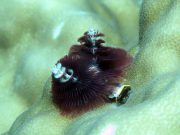Dykning med Fanorm
Koh Lantas Marineliv | Serpulidae
Fanorm er meget kendte orme på grund af deres farverige radiolarkrone, og en bestemt art ses især mange steder, når man dykker omkring Koh Lanta.
Kronen er dækket af tætpakkede mikroskopiske fremspring, der ligner små hår i en fjerlignende føde- og åndedrætsstruktur. Denne struktur er fastgjort til en lap, der omgiver munden. Voksne Serpulidae varierer i størrelse fra 2 mm til godt over 100 mm.
Fanormene bygger hårde rør af krystallinsk calciumcarbonat, som undertiden er indlejret i koraller. Det kalkholdige rør er normalt hvidt, men kan også være blåligt eller lyserødt, og er flere gange dyrets længde. Medlemmer af denne familie har en modificeret radiole (primær gren af kronen), som blokerer indgangen til deres rør, når de trækker sig tilbage i rørene.
Disse orme har ofte en rødlig pigmentering på radiolarkronen og den forreste del af kroppen. Nogle, såsom juletræsormene, har hvide, gule, orange, blå, brune eller lilla radiolarkroner.
1 arter fundet på denne side:
Christmas Tree Worms
(Spirobranchus giganteus)
Christmas tree worms are "polycheates", a sedentary worm living in hard corals. When they find a piece of live coral and burrow a home, they stay there.

Spirobranchus giganteus @ Koh Haa
They are small, about 3 - 4cm, but their bright colours and distinctive spiral shapes make them easy to spot. They can be found on hard coral formations in the reefs off Koh Lanta.
Their colourful "Christmas Tree" , feather like structures found on the surface of corals, are called Radioles. The main body of the worm in burrowed into the coral.
The feather like radioles, are the worms complex mouth appendages, allowing the worm to breathe and feed. By waving their feathers, they can catch passing plankton, moving it down to the mouth for eating.
The worms are very sensitive to movement and will retract in to their tubes if startled by shadows or moving objects. Wait a little, they will slowly open their tube and release their feathers.
Unlike other polycheates, Christmas tree worms have a third radiole, which covers the tube of the retracted worm, giving added protection. Although there are no real predators of adult worms.
This species reproduce by spawning and fertilising their eggs in the water, the larvae will then settle in the coral where it will burrow and grow into an adult.
Dykning med Fanorm omkring Koh Lanta
Dykning og snorkelture
Hvis du gerne vil have chancen for at se Fanorm på en af vores daglige dykkerture i højsæsonen fra Koh Lanta, så send os en e-mail til info@diveandrelax.com.
Deltag i vores speedbådsdykkerture i højsæsonen til nogle af Thailands bedste dykkersteder og nyd små grupper, korte rejsetider med fokus på god personlig service, sikkerhed og sjov.
Er du endnu ikke certificeret dykker? Lær at dykke på Koh Lanta med det 3-dages SSI Open Water Diver-kursus.
Book online og spar 10% på dykkerture og dykkerkurser på Koh Lanta.
Få mere at vide
Indo-Stillehavets havdyrsguider
- Allen, G., Steene, R., Humann, P., DeLoach, N. (2003) Reef Fish Identification, Tropical Pacific. Jacksonville, FL., USA: New World Publications, Inc., ISBN 1-878348-36-1.
- Humann, P., DeLoach, N., (2010) Reef Creature Identification, Tropical Pacific. Jacksonville, FL., USA: New World Publications Inc., ISBN 978-1-878348-44-9
- Debelius, H. (2013) Indian Ocean Reef Guide. Frankfurt, Germany: IKAN - Unterwasserarchiv, ISBN 978-3-939767-52-7.
- Debelius, H. (2004) Nudibranchs and Sea Snails, Indo-Pacific Field Guide. Frankfurt, Germany: IKAN - Unterwasserarchiv, ISBN 3-925919-51-1
- Erhardt, H., Knop, D. (2015) Corals Indo-Pacific Field Guide. Frankfurt, Germany: IKAN - Unterwasserarchiv, ISBN 3-925919-69-4.
- Veron J.E.N., Stafford-Smith M.G., Turak E. and DeVantier L.M. (2016). Corals of the World
Flere referencer om havets dyreliv og yderligere information


